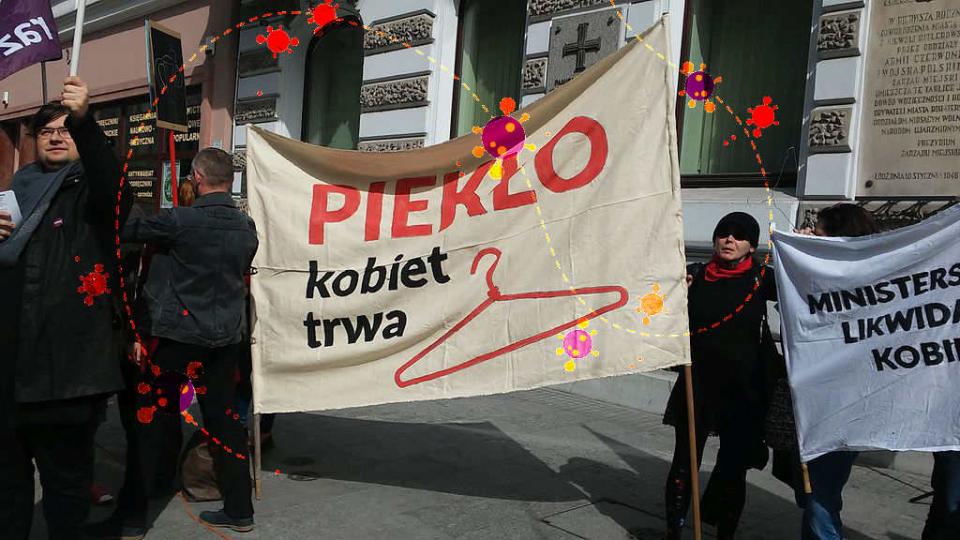
Image description: 2016 Protest in Poland against abortion law. Poster reads - Women's hell continues. Image source: Photograph by Zorro2212. Licensed under CC Attribution-Sharealike license.
By now, it’s become a distinctive symbol in Poland: a silhouette of a woman’s face picked out in black or white, and emblazoned with a jagged bolt of lightning from the top of the head to the neck.
The logo for ‘Strajk Kobiet’ (Polish Woman’s Strike), a social movement which organised the renowned Black Monday national strike in Poland against an abortion ban in 2016, the symbol has been much used in street protests in the country in recent years, as the ruling populist party Law and Justice has attempted to crack down ever further on abortion rights.
Last month, it was everywhere once again – but this time, that lightning bolt had transformed into a symbol on a face mask, and the logo was transplanted from the street to the screen. As a new bill which could restrict abortion even further was debated, Polish women found new ways to continue their protests for abortion rights, even in the face of lockdown measures caused by COVID-19.
As a new bill which could restrict abortion even further was debated, Polish women found new ways to continue their protests for abortion rights, even in the face of lockdown measures caused by COVID-19.
According to Liliana Religa, the Promotions and Communications Coordinator from the ‘Polish Federation for Women and Family Planning’ – an NGO which fights for reproductive justice – the proposal of new restrictions on abortion has come alongside a deteriorating situation for women in Poland.
“In general,” she summarises, “women’s rights have been undermined.”
“The ultra-conservative government is neglecting their duties with respect to anti-discrimination and anti-violence measures.”
“Instead they are supporting family mainstreaming policies, and the state of reproductive health and rights could be described as institutional violence.”
She lists the current restrictions: no formal sexual education, the worst access to contraception in Europe, no support for people dealing with infertility, women forced to give birth in pain.
But abortion rights are an ongoing struggle. Poland has some of the strictest abortion rules in Europe, with the procedure only allowed in three instances: foetal malformation, a pregnancy resulting from rape and incest, or a threat to the mother’s health. Legal abortions in Poland, where the population is 38 million, number only around 1000 a year.
Lately, things have been getting even worse, with attempts in recent years by the government to tighten the abortion law. A decisive moment came in 2016, when the government’s plans were abandoned after thousands of Poles across the country took to the streets to protest, in the now legendary ‘Czarny Protest’ (‘Black Protest’).
Further attempts to limit access to abortion occurred in 2018, again, sparking mass protests. Though the party did withdraw from both bills, there has been recent pressure from religious leaders and senior party figures to ban terminations due to birth defects.
And when Poland went under lockdown to try to reduce the spread of COVID-19, women faced even further obstacles in accessing abortions. There were concerns that shipments of abortion pills might not be delivered – and though Polish women had previously been able to seek abortions abroad, border closures meant this also became more difficult, with intermittent flights and the prospect of a 14-day quarantine upon their return.
But in the middle of last month, alarm bells begun to ring again about the government’s plans. A new bill was read in parliament, which could end up prohibiting abortions even for reasons such as malformation of the foetus that was the reason cited for over 90% of legal abortions in Poland.
“The repressive bill would, in practice, ban abortion completely,” believes Religa. She thinks it could force women to give birth against their will, as well as affecting the relationship between doctors and their patients. Many doctors, she says, already refusing to admit patients qualified for legal abortion for fear of negative repercussions.
“The new legislation would therefore limit access to reliable information on the condition of the foetus. There have already been cases when doctors lied to patients and concealed irreversible, severe abnormalities, depriving patients of decision-making powers.”
“It is almost certain that the new legislation would aggravate this problem.
The ‘Stop Abortion’ legislation was a citizen’s initiative initially suggested in 2017: according to parliamentary regulations, it was required that the proposal would be heard six months after the date of the first sitting of the Sejm, which took place in November.
The six-month mark thus fell in April, after Poland had gone into lockdown.
But with restrictions on leaving home, the ban on gatherings of over two people and the general concerns around safety, it was clear that street protests would not be possible to oppose the bill. Especially those like the ones seen in 2016.
An alternative had to be found: the fight went online.
“We had a week to mobilize people before the parliamentary debate and voting,” recalls Religa. To overcome the limitations from lockdown, the campaigning had to take on an unusual form – Strajk Kobiet, the Federation for Women and Family Planning and other organisations planned actions which could either take place at home or through individual activism.
“The protests were twofold,” says Religa. “Online protests involved mass mailing action to MPs, tweetstorms, encouraging people to send messages and films to MPs’ Facebook accounts, Facebook profile frames. Offline protests involved hanging posters and black umbrellas on balconies and blocking traffic in the centre of Warsaw.”
The Federation, however, mainly focused on online protests, which would allow Poles to easily exert pressure on MPs.
“It was a necessary form in the time of the coronavirus pandemic,” says Religa.
Regular tweetstorms, hashtags and photo campaigns raised awareness of the issue, whilst some younger Poles even used channels like TikTok to create short clips protesting the new bill. Others also used the tagging function on Instagram to link President Andrzej Duda’s official account to posters and pictures which opposed the law.
Regular tweetstorms, hashtags and photo campaigns raised awareness of the issue, whilst some younger Poles even used channels like TikTok to create short clips protesting the new bill.
Religa admits that these online actions were met with some negative comments on social media. There were also suggestions by some people, she recalls, that the lightning symbol of the strike was a symbol used by Nazis – but she says most people did not take this claim seriously.
Another core element of the online protests was reaching out to MPs themselves, with millions of emails eventually sent to petition them to reject the bill. The groups involved in organising the online protests helped with an email template which covered core issues in the fight: these included the right to abortion being a human right, the fact that 58% of Poles support the liberalisation of abortion rights, and the hope that all MPs would reject the ‘inhuman’ law.
Religa says MPs also received international appeals from the CoE Commissioner for Human Rights, over 100 European NGOs, MEPs, UN human rights experts, Amnesty International, and the Human Rights Watch.
“It was symbolic, but also persuasive and could have prevented MPs pushing the bill through,” she explains.
The Polish parliament did eventually vote in favour of the proposal, meaning it can pass onto the next stage in the legislative process. But the women’s protests – and particularly the innovative use of online technology show that abortion rights in Poland are still very much blossoming, even as the rest of the country is in lockdown.
Though it is uncertain when the bill will proceed, the fight in Poland is not over yet.
“The referral to the parliamentary committee is not satisfactory, but it is not the worst-case scenario,” says Religa. “The ball is still in the game and we will protest against it.”
“We will be working with opposition MPs to gain votes against the bill,” she adds.
For her, the online protests were crucial for raising the issue, although she believes they do not have as much of an impact as those on the streets.
“Large-scale, scattered protests like the Black Protests in 2016 have the greatest power,” she says. Online protests are important and they help to spread information, mobilize people, but decision-makers are rather influenced by street protests. The internet campaign was a must giving the pandemic conditions – we had to find ways to protest in a safe way and this was one of the measures.”
The internet campaign was a must giving the pandemic conditions – we had to find ways to protest in a safe way and this was one of the measures.
Responses to this post
"Gindobrey" ... to Polish women and young girls ... have spread your story on Facebook Page Voices of Women Worldwide - Poland and our website http://voicesofwomenworldwide-vowwtv.ning.com ... spread across 171+ countries with Country Representatives and Youth Ambassadors ....
- Add new comment
- 4101 views






Add new comment